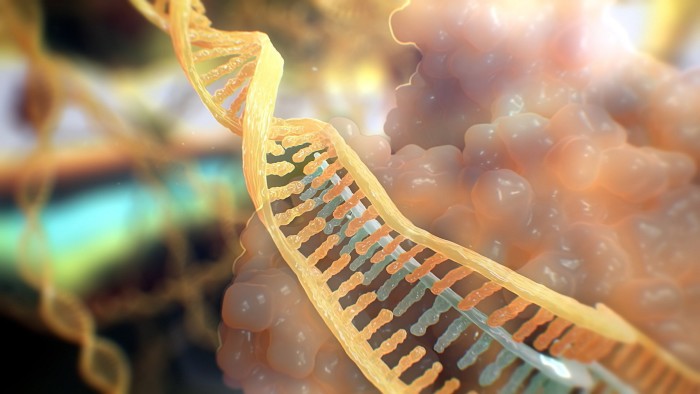Stay informed with free updates
Simply sign up to the Pharmaceuticals sector myFT Digest — delivered directly to your inbox.
AstraZeneca has signed a $555mn deal with a San Francisco-based biotech business that specialises in artificial intelligence — the latest pharmaceutical company to seek an AI partner for drug development.
The agreement with Algen Biotechnologies gives AstraZeneca exclusive rights to develop and commercialise therapies from the gene-editing technology known as Crispr. Algen was spun out of the Berkeley lab where Jennifer Doudna developed the technology, for which she won the Nobel Prize for chemistry in 2020. Doudna is an adviser to Algen.
Algen will receive up to $555mn for hitting regulatory and commercial milestones in collaboration with AstraZeneca, which is not taking an equity stake. It has previously raised $11mn and received a $350,000 grant from the National Institutes of Health in 2021 for cancer research.
While AI has the potential to speed up successful drug testing, there are few AI-discovered drugs in late-stage clinical trials, and not one has been approved. Meanwhile, the amount of cash flooding into all AI investments is seen by many as a bubble.
With AI, “I think we are definitely in a period of hype at the moment,” Jim Weatherall, AstraZeneca’s chief data scientist, said. “Today, I think our way of controlling the hype is to carefully introduce AI as a tool” for the company’s scientists, he added.
“To be sure, [AI] is no magic bullet for drug development. While sometimes it is overhyped, you don’t want to downplay it either because the potential of this technology is huge.”
New AI tools are increasingly sought by big pharma companies to save on costs and time. In 2023, Roche partnered with Nvidia to work on drug development. AstraZeneca in 2019 started a collaboration with BenevolentAI for lung and kidney diseases. But UK-based Benevolent’s shares plunged more than 99 per cent before it delisted in March.
AstraZeneca says it still has a partnership with Benevolent.
Algen, which has previously applied machine learning to oncology treatments, will be working for AstraZeneca on immune system diseases.
“We are not just analysing data using AI,” said Chun-Hao Huang, Algen’s co-founder. Rather, AI and Crispr are being paired together to generate solutions, he said.
New drugs fail up to 90 per cent of the time when they reach clinical trials. For AI to be successful, pharmaceutical companies need to do a better job at benchmarking how the technology is performing versus conventional methods, said Alex Zhavoronkov, chief executive of AI for drug discovery company Insilico.
For now, “the role of the pharma industry in AI is very limited when it comes to early stage drug discovery,” he said.

